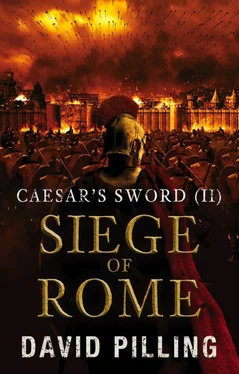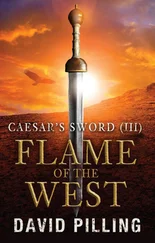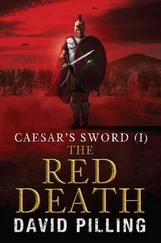David Pilling - Siege of Rome
Здесь есть возможность читать онлайн «David Pilling - Siege of Rome» весь текст электронной книги совершенно бесплатно (целиком полную версию без сокращений). В некоторых случаях можно слушать аудио, скачать через торрент в формате fb2 и присутствует краткое содержание. Год выпуска: 2013, Жанр: Исторические приключения, на английском языке. Описание произведения, (предисловие) а так же отзывы посетителей доступны на портале библиотеки ЛибКат.
- Название:Siege of Rome
- Автор:
- Жанр:
- Год:2013
- ISBN:нет данных
- Рейтинг книги:3 / 5. Голосов: 1
-
Избранное:Добавить в избранное
- Отзывы:
-
Ваша оценка:
- 60
- 1
- 2
- 3
- 4
- 5
Siege of Rome: краткое содержание, описание и аннотация
Предлагаем к чтению аннотацию, описание, краткое содержание или предисловие (зависит от того, что написал сам автор книги «Siege of Rome»). Если вы не нашли необходимую информацию о книге — напишите в комментариях, мы постараемся отыскать её.
Siege of Rome — читать онлайн бесплатно полную книгу (весь текст) целиком
Ниже представлен текст книги, разбитый по страницам. Система сохранения места последней прочитанной страницы, позволяет с удобством читать онлайн бесплатно книгу «Siege of Rome», без необходимости каждый раз заново искать на чём Вы остановились. Поставьте закладку, и сможете в любой момент перейти на страницу, на которой закончили чтение.
Интервал:
Закладка:
“Peace,” he said patiently, “you will have a chance to show your valour. Not, however, in the vanguard. That is not the place for untried youths.”
Mention of Antonina made my skin prickle. I had glimpsed her a few times on the march, in a covered litter toward the rear of the army, lying full-length on a comfortable divan and sunning herself with the silk curtains drawn back. She had brought her ladies with her. At Palermo Belisarius set up a little camp for them apart from the main army, well away from the prying eyes and lustful impulses of our soldiers. I had heard rumours that she insisted on being present at her husband’s military councils, and even on giving him advice, but tonight she kept her distance.
Belisarius switched his attention to Galierus. “How deep are the waters of the bay?” he asked, “deep enough for our ships to approach within bow-shot of the walls?”
“Yes, general,” the admiral replied.
“Then we shall attack at dawn,” Belisarius said cheerfully, “and the city shall fall without a single casualty on our side. What do you think of that, Bessas?”
The old soldier and his colleagues looked nonplussed. “I think it most unlikely, sir,” he replied, “the Goths may have been abandoned by their king, but they are determined to resist.”
“There must be blood,” said Constantine, “and lots of it.”
Belisarius burst out laughing. I had rarely seen him in a better humour, and looked questioningly at Procopius, but he ignored me.
“God bless you, you old butchers,” said the general, wiping a tear of mirth from his eye, “there must be blood, eh? Well, let it be Gothic blood, for I have no intention of wasting ours on this flyspeck of a city.”
His officers looked offended, as well they might, for they were all proud men. Their sullen humour quickly melted to disbelief as Belisarius went on to outline his plan. I listened with mounting admiration for this extraordinary soldier, whom God had sent to rescue the Empire from disgrace and decay.
I spent the night in one of the guard tents close to Belisarius’ pavilion. In the morning we were roused early to accompany him onto the high bluffs overlooking Palermo. From there we watched Galierius, who had returned to the fleet after the council, carry out the general’s orders.
The bay of Palermo, as I have said, was open and undefended. During the night sixteen of our transports had used their oars to crowd into the harbour, as close to the sea-walls as the depth of water would allow. I could see the steel helmets of the Gothic soldiers on the battlements. They had no catapults or ballistae, and must have had a limited supply of arrows, for they did nothing but watch as our ships rowed closer.
Belisarius had ordered his Isaurian spearmen and archers to assemble in battalions on the plain beyond the eastern walls of the city. Scaling ladders had been fetched from the baggage, and three great battering rams pieced together. To the Goths, it must have looked as though we were preparing for an all-out assault.
It was a ruse. When our ships were within range, their crews used ropes and chains to hoist longboats and other smaller vessels up to the mastheads. Picked archers and javelin-men then clambered up the rigging and jumped into the boats.
Only now did the Goths realise what was afoot. The mastheads of our ships were much higher than the ramparts of the sea-defences. From their lofty height our men now unleashed a hail of arrows and javelins down on the exposed heads of the enemy. Some lit fire-arrows, and shot them into the town itself, where they set roofs and houses aflame and spread terror among the citizens.
“You see?” said Belisarius, nudging Bessas with his elbow, “I said we would take Palermo without losing a drop of Roman blood. We should have had a wager on it.”
“The city has not fallen yet,” grumbled the other man, but the general was right. The fighting spirit of the Goths was not as stout as their spokesmen had pretended. Even as we watched, the archers on the walls abandoned their posts and fled into the streets, leaving dozens of dead and wounded strewn on the ramparts, their bodies stuck full of missiles.
Panic rippled through the city. A bell sounded inside one of the larger churches, and we saw the tiny figures of the citizens running to and fro. Our archers continued to pour flaming arrows into the streets. More buildings caught fire, especially in the poorest quarters, where all was dry timber and thatch. Plumes of blackish smoke twisted into the sky, while orange flames danced and leaped from one roof to another.
Antonina was present, clothed all in white silk, which lent her the appearance of a goddess among so many rough, ill-favoured soldiers. She clung to her husband’s arm, and occasionally leaned in to whisper something in his ear. It angered me to see how he doted on her. All his attention should have been fixed on the battle below, but Antonina distracted him from his duty.
Do I sound envious? Perhaps a little. She was a great beauty, especially in those days, and unlike her friend Theodora required little artifice to sustain that beauty against the advancing armies of time. Her milky complexion remained as fresh as a young girl’s, though she was well into her thirties by now. The golden hair, which she wore bound up in the aristocratic Roman style, with long, curly ringlets framing her delicate cheeks, was as lustrous as ever. I feared her, and desired her, and all the time struggled to avert my eyes from her.
Thankfully, she paid no attention to me, or pretended not to. Her son Photius was absent. As a sop to the boy’s eagerness, Belisarius had allowed him to join one of the assault-parties mustered on the plain. He was safe enough, for they were destined to see no action.
“Not long now,” remarked Procopius, who had shuffled next to me. He was gazing complacently down at the chaos inside Palermo, like a hawk contemplating its prey.
The courage of the Goths soon wilted. Barely two hours after we begun our assault, their gates opened and a group of dignitaries filed out, waving olive branches in a token of peace.
Belisarius agreed to discuss terms. They were straightforward enough: in return for clemency, the Goths agreed to lay down their arms and surrender the city. Belisarius allowed the garrison to march out with honour, unarmed but with their banners flying, and to take ship for the Italian mainland.
With the fall of Palermo, his conquest of Sicily was effectively complete. Leaving a strong garrison to hold the city, he marched south to Syracuse, an ancient city in the south-east corner of the island.
The Gothic governor yielded it up without the faintest show of resistance, and Belisarius entered in triumph at the head of his bucelarii. I rode close behind him. My sickness had passed completely, and my spirits were buoyed by the rapturous reception.
By now our commander’s fame had spread to every corner of Sicily. The people of Syracuse flocked to welcome and applaud the conqueror of Africa and hail him as a new Caesar. Belisarius knew how to court popularity, and scattered gold coins and medals among the adoring crowds as he rode through the streets.
My joy was tempered with caution. The chants of Caesar! Caesar! were disquieting. Rome already had a Caesar in the form of Justinian, and it wouldn’t take much for the Emperor’s suspicions of Belisarius to flare hot again. He had his spies among our army. If Belisarius gloried too much in the acclaim of the mob, they would go racing back to Constantinople to pour fresh rumours of treason into Justinian’s ears.
Belisarius took up residence in the governor’s palace. There he received a steady flow of Gothic officers and diplomats from all over Sicily, come to bend the knee before him and swear allegiance to the Empire.
Читать дальшеИнтервал:
Закладка:
Похожие книги на «Siege of Rome»
Представляем Вашему вниманию похожие книги на «Siege of Rome» списком для выбора. Мы отобрали схожую по названию и смыслу литературу в надежде предоставить читателям больше вариантов отыскать новые, интересные, ещё непрочитанные произведения.
Обсуждение, отзывы о книге «Siege of Rome» и просто собственные мнения читателей. Оставьте ваши комментарии, напишите, что Вы думаете о произведении, его смысле или главных героях. Укажите что конкретно понравилось, а что нет, и почему Вы так считаете.












